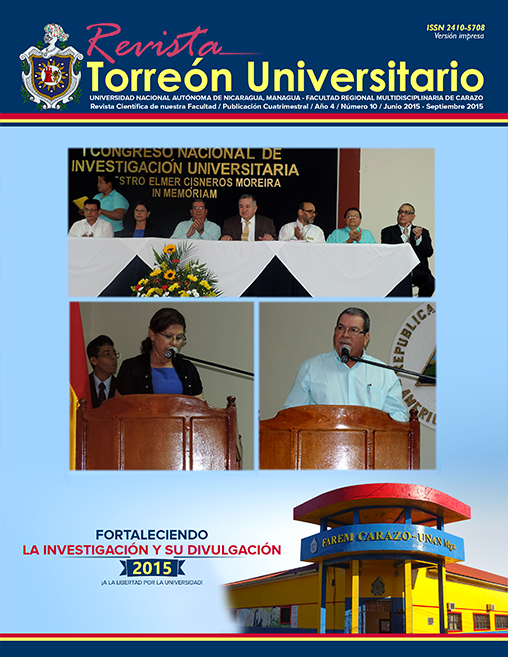Valuation of the Professors Technological Competencies of UNAN-MANAGUA, Case: FAREM-CARAZO
Abstract
In the current society, the technologies of information and communication, TIC, revolve around all the processes of information and communication, distinguishing the telematics and communicative processes. This is so, until the society of this century turns out to be called “the information society”, “Web generation”, “generation I”, (of internet and/or information), and including the WhatsApp generation. Also in words of professor Manuel Castell (2001): society in net, or, the information era; as Echaverrìa (2000) points out, the new technologies light a new social space; the third environment, which clearly differs from the natural and urban ones.
This study takes as one of its principles, the proposals already indicated by UNESCO related to the project “standards of TIC competencies for teachers”, ECD-TIC (as in Spanish), when noting that “teachers need to be prepared to empower students with the advantages given by TIC. Schools and classroom, face-to-face or virtual ones should count with teachers who have the competencies and resources of TIC and being able teach efficienly the correspondent subjects, including at the same time in their teaching, concepts and abilities of them” (UNESCO, 2008:p.6).
In this sense, we focus our context of doing on detecting the formative TIC needs that teachers have in FAREM-Carazo. So based on that, design and implement a virtual space for the didactic use of applications of the Web 2.0.
Downloads
Downloads
Published
How to Cite
Issue
Section
License
Los autores que publican en esta revista están de acuerdo con los siguientes términos.
- El autor o los autores de los artículos, ensayos o investigaciones conceden a la Universidad Nacional Autónoma de Nicaragua, Managua (UNAN-Managua) los derechos de edición (copyright) del trabajo enviado, por consiguiente la Universidad cuenta con el derecho exclusivo para publicar el artículo durante el periodo completo de los derechos de autor.
- Estos derechos de autor/ autores autorizan a la Revista Torreón Universitario y a la Universidad editar y divulgar/publicar el artículo en dicha Revista, incluyendo reproducción impresa y electrónica, el almacenamiento, recuperación y cualquier otro tipo de publicación, y fuentes de información secundaria como servicios de resúmenes y bases de datos, así mismo la facultan a proteger el artículo contra el uso no autorizado para su difusión por medios impresos o electrónicos (PDF, HTML, EPUB, XML u otros).
Licencia para el uso del contenido
La revista hace uso de la Licencia Creative Commons Atribución-NoComercial-SinDerivar 4.0 Internacional.
Bajo esta declaración:

Este revista está sujeta a una licencia de Creative Commons Reconocimiento-NoComercial-SinObraDerivada 4.0 Internacional. Puede ser copiada, distribuida y transmitida públicamente siempre y cuando se cite al autor y la fuente (Revista Torreón Universitario), no debe modificarse ni utilizarse con ningún fin comercial. La licencia completa se puede consultar en http://creativecommons.org/licenses/by-nc-nd/4.0/.

